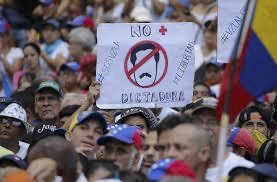The United States is back again in Venezuela — this time, for their oil
The U.S. is meddling in the presidency in Venezuela and Guatemala is a good historical example of why it’s happening
More stories from Ben Strong

Photo by Submitted
Pictured is an anti-Maduro protest that took place in Venezuela on Nov. 16, 2019. Photo credit to Ariana Cubillos of the Associated Press
The U.S. has a long history of sticking its hands in the business of foreign nations.
Just recently in Venezuela — despite being the elected president — Nicolás Maduro’s presidency is being contested by Juan Guaidó.
A coup, which is the removal of an existing government from power, began in Guatemala in 1954 and it offers insight into what’s happening in the current Venezuelan coup.
The coup in Guatemala marked the end of the Guatemalan Revolution — an uprising from the people, which forced out Jorge Ubico, military dictator, in 1944.
In 1951, Jacobo Árbenz was democratically elected to the presidency, making him the second democratically elected president of Guatemala, with the first being Juan José Arévalo.
Arévalo introduced policies like minimum wage, universal suffrage and democracy into Guatemala. Árbenz then introduced Decree 900.
This law redistributed unused land above 224 acres back to the peasantry, while compensating the original owners with government bonds.
The U.S. didn’t particularly mind Arévalo introducing the things he did because it didn’t threaten their stake in Guatemala. But — with Decree 900 — the United Fruit Company wasn’t very happy about it.
The UFC owned 550,000 acres of land and only cultivated 15% of it, meaning the rest of it was to be re-distributed to the peasants.
This, in my opinion, is a good thing, as it gives the land not only a chance to be utilized, but it also gives the peasants the opportunity to earn a living on their own terms.
UFC, of course, didn’t like that they couldn’t have the biggest cut of the pie. Two of President Dwight D. Eisenhower’s staff members had ties to the UFC, so after years of lobbying, a U.S. sponsored coup drove Árbenz out of Guatemala.
There’s much less direct intervention by the U.S. in Venezuela than Guatemala, as far as we know. With Guatemala, the CIA trained 480 opposition fighters to essentially go into battle and die so their anti-government propaganda campaign and air bombings of Guatemala City would scare the military into not taking action.
Our government’s involvement was based more in economics.
The Trump administration is diverting nearly $42 million to the Guaidó government to pay their salaries and provide the Venezuelan people with unbiased and unfiltered sources of news and information.
It’s also important to note from the memo that $2 million is being used to fund the party in opposition to Maduro.
Trump has also implemented extremely broad sanctions on Venezuela that freezes all of its assets in the U.S. and barred any trade with the authorities of Venezuela (keep in mind that Maduro still holds power).
It’s the same strategy as Guatemala but with less bullets. Incite fear or anger into the public, which will inevitably be pointed at the president (which you see happen all over the world, including the U.S.).
That fear can then be used to topple whatever regime is impeding you. For Guatemala, the fear of the U.S. attack made the military not support Árbenz. For Venezuela, the U.S. is using anger to delegitimize Maduro’s regime.
In Guatemala, it was fruit — mostly bananas — that the UFC wanted. In Venezuela: Oil.
When the United States’ imperialist prospects are threatened in the world, America will step in to topple the governments that impose them. At the same time, when a foreign government has a better system of governance, the U.S. has to step in to make sure that no one else sees that another system of government is possible.
There are a few situations where U.S. foreign intervention is good. But when it’s to keep its imperialist ties or simply to topple a better government, that is an egregious overstep of power simply not permissible in a moral society.
Strong can be reached at [email protected].
